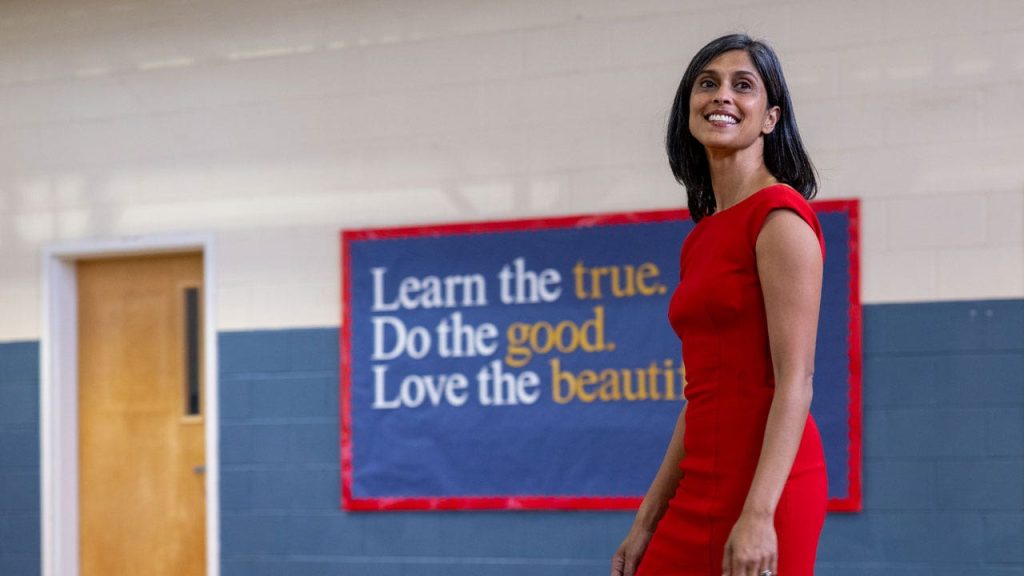Second Lady Usha Vance Champions Reading Over Screen Time
In a heartfelt plea to America’s students, Second Lady Usha Vance is encouraging young people to set aside their electronic devices and embrace reading as a pathway to improved focus and literacy. During her visit to Cherokee Classical Academy in Canton, Georgia, Vance shared personal insights that led to her 2025 Summer Reading Challenge initiative. The revelation came when her middle child, inspired by watching his older brother read, asked her to teach him the skill. This request prompted Vance to delve into the mechanics of teaching reading, a journey she described as “eye-opening” regarding the state of literacy in America. The experience highlighted both the challenges and opportunities in addressing reading proficiency among today’s youth.
“It’s wonderful to pick up things that are just a little harder and that require you to focus just a bit more… so later you can focus on what really matters,” Vance told students during her visit. She acknowledged the difficulties of maintaining concentration in our technology-saturated environment, noting, “I think it’s a pretty hard time right now for a lot of people because we all have these iPhones and iPads – all these things that kind of draw your attention away.” Her comments resonated particularly at Cherokee Classical Academy, which maintains a “low-tech learning environment” with strict prohibitions on cellphone use during school hours. This approach aligns with Georgia’s recently enacted Distraction-Free Education Act, which will ban electronic devices on school grounds for students from kindergarten through eighth grade starting in July 2026.
The movement to limit screen time in educational settings is gaining momentum nationwide, with twenty states now implementing school-day cellphone bans. Many other states are developing policies that restrict usage during class time or are requiring schools and districts to establish their own guidelines. These measures reflect growing concerns about the impact of constant connectivity on learning outcomes and student wellbeing. The statistics support these concerns, with 72 percent of teachers reporting that cellphones have negatively affected their students’ mental health, according to the National Center for Education Statistics. Medical professionals, including American Medical Association President Bobby Mukkamala, M.D., have warned that excessive screen time can interfere with healthy sleep patterns, increase anxiety and depression risks, and reduce physical activity among young people.
Vance sees reading as an effective counterbalance to electronic device usage, alongside other engaging activities that require focus and commitment. “Whether that’s spending time outside, whether that’s engaging in the kinds of activities where you just can’t be distracted – you really have to commit to build strength or skill or whatever it might be,” she explained to reporters. The Second Lady practices what she preaches in her own family life, sharing that outdoor activities are a priority in the Vance household. She also enjoys creative projects that engage her hands and imagination, telling Fox News Digital, “I built my kids a whole kitchen out of cardboard boxes and recycled materials. I’m building them a dollhouse right now,” which she mentioned will resemble their actual home.
The 2025 Summer Reading Challenge, launched in June, represents Vance’s commitment to improving literacy across the nation. The initiative encourages schoolchildren to read books throughout summer vacation, track their progress, and experience the multifaceted benefits that reading provides. This approach aligns with Dr. Mukkamala’s recommendation that children take “intentional breaks from screens” by establishing routines that include activities like reading. By promoting literacy, Vance hopes to address concerning trends in reading proficiency while offering students an enriching alternative to digital distractions.
The Second Lady’s advocacy comes at a critical juncture when many families and educators are reassessing the role of technology in children’s lives. With states increasingly implementing policies to create distraction-free learning environments and medical experts highlighting the health implications of excessive screen time, Vance’s message resonates beyond the classroom. Her personal anecdotes about teaching her own children to read and engaging in hands-on creative projects with them humanize the issue, suggesting that the path to improved literacy and focus may begin with simple actions: putting down devices, picking up books, and embracing activities that require sustained attention and effort. Through her Summer Reading Challenge and public appearances, Usha Vance is working to make reading an attractive, accessible option for students across America.


